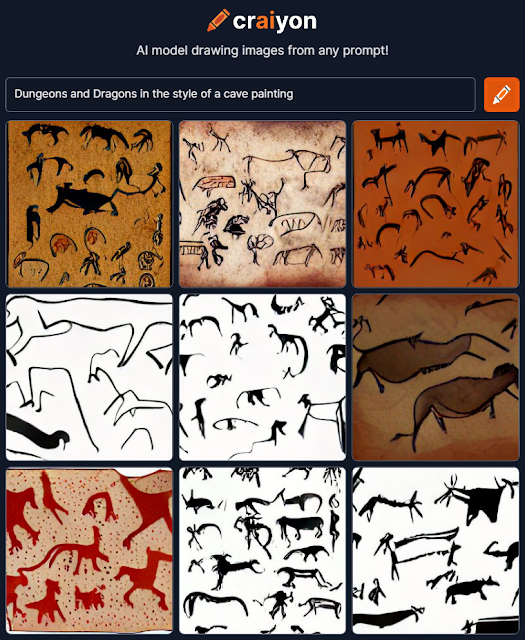Double warning: This is a galaxy brain post; and I claim no special expertise. If this question has been formally interrogated through one or more disciplines (arts education, art therapy, anthropology, neurology?) I appreciate referrals.
Why weren’t tabletop roleplaying games invented much sooner? Various commentators have pointed out that all the tools were available from ancient times, and widely available from the time literacy was common. But they didn’t arrive in a recognizable form until the 1970s.
So here is my theory. Imagine an ancient hunter-gatherer society. They’ve mastered fire. Control of fire means, for the first time, a (relatively) safe area where they can focus their considerable brainpower on something beyond just survival. So they tell stories.
And while some societies had dedicated storytellers and lore-keepers, presumably many cultures told shared stories, where anyone around the fire could contribute. Changing or adding to old stories. Creating something new. Taking on different roles within the fictional narrative. Similar to roleplaying, right? Add some formalized prompts and a bit of randomness and you have a storytelling game like For the Queen or Fall of Magic.
For thousands of years, this local, collective expression of the performing arts doesn’t change that much. It may be farmers around a hearth instead of hunters around a campfire, but the basic logic is the same. Up until the end of the 19th century, if you were an ordinary person outside a major urban area who wanted to experience live storytelling, theater, music, dance, and the performing arts generally, your community’s most consistent option was to do it itself. You would be a performer and a creator, not just an audience member.
Community members learned to play instruments because that was the only way their families and neighbors were going to hear music regularly. Churches and schools held pageants and plays because that was the only regular source of dramatic performance available. If those prehistoric people gathered around the fire could see these performances, up through the 19th century, they would still recognize it, on some level, as the same tradition they engaged in thousands of years prior.
Then – within a generation in the early 20th century – that all changes. The phonograph, radio, and film are not only available, but available cheaply to a mass audience. Television follows soon after. Average people have easy, affordable access to entertainment and culture they and their community took no part in producing.
For the first time, that ancient desire to be an audience for art is easily satisfied without the work of participating in the creation of art.
But the ancient drive to create is still there, unfulfilled. Certainly many people still choose to become creators. But I think there is some rather large percentage of people on the margin who would have gotten involved in the pre-media era of art creation if they had lived before mass media, but do not get involved in the mass media age. They remain consumers only.
And that’s why the invention of TTRPGs makes sense in a mid-20th century world saturated with passive media. They are a hack to bring the passive consumers on the margin back into the act of creation. I don’t think TTRPGs are unique in this role; many functions of the internet have allowed ordinary people to find that creative margin too. But TTRPGs do have an interesting, pathbreaking role in the return to community creation.





No comments:
Post a Comment